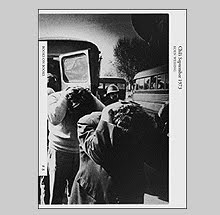The Complete Films of Robert Frank: Volume 2
"A decision; I put my Leica in a cupboard. Enough of lying in wait, pursuing, sometimes catching the essence of black and white, the knowledge of where God is. I make films. Now I speak to the people who move in my viewfinder. Not simple and not especially successful." - Robert Frank
Not simple for sure. For an artist who is not interested in any compromise of vision, his are film works that challenge everything from notions of "professionalism" to narrative structures. Volume 2 of Steidl's Complete Film Works of Robert Frank presents three films; OK End Here (1963), Conversations in Vermont (1969), and Liferaft Earth (1969).
OK End Here is possibly one of his easier films to digest. The story is about a handsome young couple stuck in the inertia of a relationship and wiling away a Sunday afternoon. They don't have anything to do and obviously do not know what to do with each other. The silence between them, the inability to fully communicate, to listen, seems under examination here. The woman desires communication, "Talk to me," while the man answers almost mockingly, "What do you want to talk about? Politics? Films? Proust?" "Just talk to me," she counters.
These moments of exhausting distance between the couple makes the title sentiment OK End Here an obvious resolution. It seems as though we are waiting for the one word or sentence that will cause the relationship to crumble. Instead they plod along with their day receiving a couple of visitors to their apartment and then venturing out into the dreary grey day.
Later while the couple is at a restaurant they are joined by a friend and the woman he was dining with. Among the small talk, the woman starts to read a letter from a man who ended a relationship with her. For a while our female protagonist listens intently but soon the swirl of conversations and laughter of the restaurant drown out all interest in what the woman is reading despite the obvious emotional importance of the letter. In tears she runs out of the restaurant exclaiming, "You're all only interested in yourselves!"
Frank's couple then walks the streets and the woman says that he will become 'old' (old as in age or old as in a stale relationship?). They enter the building's elevator, she cuddles up to him and as they smile warmly the doors shut. OK End Here.
Conversations in Vermont is Frank's documentary form of self examination through the images and words of his two children, Andrea and Pablo. Photographed mostly by Ralph Gibson, Frank interviews them about how they felt about the life they led in NYC and the life they now lead in a Vermont. Interspersed are scenes of still photographs of his family and some of his well known images from The Americans.
The film starts with a self portrait of Frank cleaning the camera lens as it is running film. He says humorously, "Let's see." Conversations is a look into the past and a confrontation of sorts. Frank appears to be wanting admission of something he feels guilty about -- like a father who has failed to raise his children "normally" whatever "normal" may be. The conversation with Pablo addresses that very question but it is what is not said that is all the more meaningful. It is a display of Father and son drifting apart and the pain of that gap.
This curious film is rough and direct. Frank appears before the camera as interviewer and director assuring that the film is actually more about his internal questions than the direct answers from his children.
Liferaft Earth, made the same year as Conversations in Vermont is the documentation of a 1969 hunger strike that took place in a parking lot in California. Surrounded by a huge circle of plastic sheeting, one hundred hippie types stage a "starve-in" to bring awareness of world overpopulation and under-nutrition. Frank and Danny Lyon who recorded sound join the "liferaft" to document the "hunger circus" and media attention it gathers. (Is that Andy Warhol inside the "raft" with a super 8 camera?)
As the participants start to succumb to starvation and difficult weather, Frank and Lyon also decide to leave. After a hearty meal, Frank confesses his shame in giving up "I didn't have the guts," and he and Lyon set out to face the remaining days of the starve-in which had been moved from the parking lot to a house in the woods near San Francisco.
Frank and Lyon wander around the home asking people "Are you alive?" while the 52 "survivors" have conversations, argue and participate in primal screaming. Liferaft Earth is a political film but also like most of Frank's works, it is also one of self-examination where he balances between being an outsider and one of the group.
Frank's films are rarely screened so most who have come to know The Americans for its brilliance haven't been able to follow the path of his film work. I find it curious that other than the legendary Cocksucker Blues and Me and My Brother, these haven't really gotten much attention besides from the most diehard of Frankofiles. Difficult as they are, it cannot be denied that each is a unigue inquiry into life that do their best to break with convention.
Each set of these films comes in an inventive packaging in the form of small DVD sized film canisters enclosed in a cardboard box made to look like a 16mm film stock package. Each of the DVDs has both PAL and NTSC formats. Volume 3 to be reviewed soon.
Buy Online at Steidlville












